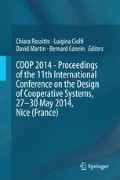Abstract
Motivated by rising global energy demands and a growing awareness of the scarcity of natural resources sustainable mobility concepts are more in demand than ever before. One solution is offered by ridesharing concepts, realized with ICT-supported mobile interaction systems. However, current systems mainly address issues of comfort and efficiency and thus refer to mobility widely in functional terms of transport. We argue in this paper for a praxis-based exploration that refers to personal ridesharing experiences embedded in people’s daily mobility and life world. We will show that a phenomenological inquiry provides added value in understanding practical challenges in a ridesharing context, and we will identify methods used to address practical challenges that can provide new starting points for design.
Access this chapter
Tax calculation will be finalised at checkout
Purchases are for personal use only
Notes
- 1.
http://www.maxqda.com/ (last view: 01.01.2014).
References
Brereton M, Roe P, Foth M, Bunker JM, Buys L (2009) Designing participation in agile ridesharing with mobile social software. In: Proceedings of the 21st annual conference of the Australian computer-human interaction special interest group: design: open 24/7, ACM, pp 257–260
Büscher M, Urry J (2009) Mobile methods and the empirical. Eur J Soc Theory 12(1):99–116
Büscher M, Urry J, Witchger K (2010) Mobile methods. Taylor & Francis
Button G, Dourish P (1996) Technomethodology: paradoxes and possibilities. In: Proceedings of the SIGCHI conference on human factors in computing systems, ACM, pp 19–26
Crabtree A (2004) Taking technomethodology seriously: hybrid change in the ethnomethodology—design relationship. Eur J Info Syst 13(3):195–209
Dourish P, Anderson K, Nafus D (2007) Cultural mobilities: diversity and agency in urban computing. In: Human-computer interaction–Interact 2007, Springer, pp 100–113
Garfinkel H (1963) A conception of and experiments with‚ trust as a condition of concerted stable actions. The production of reality: essays and readings on social interaction: pp 381–392
Garfinkel H (1967) Studies in ethnomethodology. Englewood Cliffs, NJ
Ghelawat S, Radke K, Brereton M (2010) Interaction, privacy and profiling considerations in local mobile social software: a prototype agile ride share system. In: Proceedings of the 22nd conference of the computer-human interaction special interest group of Australia on computer-human interaction, OZCHI ’10. New York, NY, USA: ACM. pp 376–379
Handke V, Jonuschat H (2012) Flexible ridesharing: new opportunities and service concepts for sustainable mobility. Springer, Berlin
Ihde D (2002) Bodies in technology. U of Minnesota Press, Mineapolis (Bd. 5)
Laurier E, Lorimer H, Brown B, Jones O, Juhlin O, Noble A, Perry M et al (2008) Driving and ‘passengering’: notes on the ordinary organization of car travel. Mobilities 3(1):1–23
Luff P, Heath C (1998) Mobility in collaboration. In: Proceedings of the 1998 ACM conference on computer supported cooperative work, ACM pp 305–314
Massey D (1999) Space-Time, ‘science’ and the relationship between physical geography and human geography. Trans Inst Br Geogr 24(3):261–276
Meurer J, Stein M, Randall D, Rohde M, Wulf V (2014) Social dependency and mobile autonomy—supporting older adults mobility with ridesharing. In: Proceedings of the ICT 2014 ACM annual conference on human factors in computing systems CHI, Toronto
Mirisaee SH, Brereton M, Roe P (2011) Bridging the representation and interaction challenges of mobile context-aware computing: designing agile ridesharing. In: Proceedings of the 23rd Australian computer-human interaction conference, ACM, pp 221–224
Ozenc FK, Cranor LF, Morris JH (2011) Adapt-a-ride: understanding the dynamics of commuting preferences through an experience design framework. In: Proceedings of the 2011 conference on designing pleasurable products and interfaces, 61
Radke K, Brereton M, Mirisaee S, Ghelawat S, Boyd C, Nieto JG (2011) Tensions in developing a secure collective information practice-the case of agile ridesharing. In: Human-computer interaction–interact 2011, Springer, pp 524–532
Schütz A (1967) The phenomenology of the social world. Northwestern University Press, Evanston
Sheller M, Urry J (2003) Mobile transformations of ‘public’ and ‘private’ life. Theory, Cult Soc 20(3):107–125
Sherlock K (2001) Revisiting the concept of hosts and guests. Tourist Stud 1(3):271–295
Steger-Vonmetz DC (2005) Improving modal choice and transport efficiency with the virtual ridesharing agency. In: Proceedings of Intelligent transportation systems, 2005, IEEE, pp 994–999
Tamminen S, Oulasvirta A, Toiskallio K, Kankainen A (2004) Understanding mobile contexts. Pers Ubiquit Comput 8(2):135–143
Teodorović D, Dell’Orco M (2008) Mitigating traffic congestion: solving the ride-matching problem by bee colony optimization. Transp Plan Technol 31(2):135–152
Urry J (2004) The ‘system’ of automobility. Theory, Cult Soc 21(4–5):25–39
Urry J (2007) Mobilities. Cambridge, UK; Malden, MA: Polity
Wash R, Hemphill L, Resnick P (2005) Design decisions in the ridenow project. In: Proceedings of the 2005 international ACM siggroup conference on supporting group work, ACM pp 132–135
Wessels R, Pueboobpaphan R, Bie J, van Arem B (2011) Integrating online social networks with ridesharing systems: effects of detour and level of friend
Winch P (2002) The idea of a social science: and its relation to philosophy. Routledge
Witzel A, Reiter H (2012) The problem-centred interview. Sage
Wulf V, Rohde M, Pipek V, Stevens G (2011) Engaging with practices: design case studies as a research framework in CSCW. In: Proceedings of the ACM 2011 conference on computer supported cooperative work, ACM pp 505–512
Acknowledgments
We thank all interviewees for their participation, our student assistants for transcription work and discussions, our local partners for their support in addressing participants and University Heidelberg. Further we thank the BMBF for funding this project.
Author information
Authors and Affiliations
Corresponding author
Editor information
Editors and Affiliations
Rights and permissions
Copyright information
© 2014 Springer International Publishing Switzerland
About this paper
Cite this paper
Meurer, J., Stein, M., Wulf, V. (2014). Designing Cooperation for Sustainable Mobility: Mobile Methods in Ridesharing Contexts. In: Rossitto, C., Ciolfi, L., Martin, D., Conein, B. (eds) COOP 2014 - Proceedings of the 11th International Conference on the Design of Cooperative Systems, 27-30 May 2014, Nice (France). Springer, Cham. https://doi.org/10.1007/978-3-319-06498-7_21
Download citation
DOI: https://doi.org/10.1007/978-3-319-06498-7_21
Published:
Publisher Name: Springer, Cham
Print ISBN: 978-3-319-06497-0
Online ISBN: 978-3-319-06498-7
eBook Packages: Computer ScienceComputer Science (R0)

